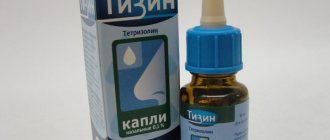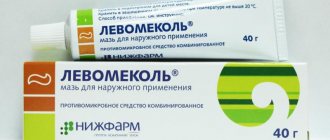With the onset of pregnancy, the range of medications approved for the treatment of expectant mothers is sharply reduced, while the risk of getting some kind of infection, on the contrary, increases several times! A woman’s immune system weakens due to hormonal changes, so the body from time to time presents surprises in the form of weakness, dizziness or a simple stuffy nose. By the way, a runny nose during pregnancy not only worsens the quality of life of the mother, but also threatens oxygen deficiency for her baby. The medicine Xylene helps to quickly improve your well-being with this symptom. Read the article to see how safe the drug is for the expectant mother.
Composition of the drug
The active substance of the drug is a drug called Xylometazoline.
The medication belongs to the class of vasoconstrictors from the group of alpha-adrenergic agonists. Xylometazoline affects the small capillaries of the nasal mucosa. It binds to special receptors in blood vessels, causing a narrowing of their lumen. Due to the described effect, the intensity of blood flow decreases and the swelling of the mucous membrane decreases. The medicine causes dilation of the nasal passages and easier breathing.
The drug also suppresses the intensity of the inflammatory process in the epithelium of the nasal cavity. This action leads to a decrease in the formation of exudate - reduces the amount of discharge, eliminates a runny nose.
A positive feature of the drug is the lack of absorption into the systemic circulation if the rules of use are followed. Due to this, it does not have a general effect on the body. The drug begins to act a few minutes after use, the therapeutic effect lasts for 4-8 hours.
Xylene drops and pregnancy
Xylene is a drug whose use is not recommended during pregnancy and breastfeeding.
This remedy does not have any negative effects on a woman’s body during pregnancy, and especially on her developing baby. However, there is a high probability that Xylene is able to influence blood pressure during pregnancy and change the tone of the placental vessels. It is for this reason that the use of Xylene during pregnancy can be carried out only after consultation with a specialist and only if the effect of treatment is significantly higher than possible complications for the fetus.
It is recommended to use Xylene drops approximately 2-3 times, with 1-2 drops of the drug administered into each nasal nostril. The entire course of treatment should not exceed five days, since after this period of time the body becomes accustomed to this drug.
Diseases of various types are constant companions of a woman during pregnancy. However, despite the high effectiveness of some medications, it is recommended to use them only after consultation with a specialist.
Release form and expiration date
Pharmacies offer several types of Tizin for all groups of the population and relief of symptoms for various diseases. There are separate release forms for use in children.
Tizin Classic is a dosage form of the drug developed for adults. The medication is available in the form of a nasal spray containing a 0.1% solution of the active substance. The shelf life of the drug is 36 months.
Tizin Expert is a release form for adults. In addition to Xylometazoline, it contains hyaluronic acid. The medicinal component additionally moisturizes the mucous membrane of the nasal cavity, preventing dryness and the formation of crusts. Hyaluronic acid improves regeneration processes in the epithelium of the nasal turbinates.
Tizin Expert is available in the form of a nasal spray containing 0.1% of the active substance. The shelf life of the drug is 24 months.
Tizin Allergy is developed for the treatment of allergic diseases accompanied by rhinitis. According to the instructions for use, the drug contains another active substance - Levocabastine. The mechanism of action of the drug is based on blocking inflammatory mediators. Due to this, Tizin Alergy reduces itching, swelling of the nasal cavity, and also fights the formation of exudate.
The drug is available in the form of a nasal spray. One milliliter of solution contains 0.5 milligrams of the active substance. The drug should not be used after the expiration date of 24 months.
Pharmacies also sell children's forms of Tizin Classic and Tizin Expert. They have active ingredients similar to medications for adults. Nasal sprays for children are characterized by a halved dosage of the drug.
Indications for use
Tizin with Xylometazoline is indicated for the symptomatic treatment of acute inflammatory diseases of the upper respiratory tract, accompanied by a runny nose. These include bacterial and viral infections caused by various microorganisms.
The drug can also be used to relieve swelling of the nasal cavity and facilitate breathing in case of allergic rhinitis. The drug is indicated for one-time relief of allergy symptoms; it is not suitable for systematic use.
Tizin is recommended for use in cases of inflammation in the paranasal sinuses and middle ear. The drug improves the removal of pathological exudate and reduces unpleasant symptoms.
The medication can be used before diagnostic measures in the nasal cavity. The medicine allows you to expand the area of study by reducing swelling.
Tizin alert is indicated for the treatment of allergic diseases accompanied by swelling of the nasal mucosa. The drug is most often used for hay fever - seasonal rhinitis in response to pollen from various plants.
Treatment of rhinitis in pregnant women:
About the drug "Xymelin"
Nasal drops "Xymelin" is a powerful drug that is prescribed for various inflammations of the ENT organs . The registered medication is produced in the form of a nasal spray with a volume of 10 and 15 milliliters. It is lowered together with the nebulizer for convenient use when treating children and adults. The drug is available without a prescription , but it should be used only after consultation with your doctor.
The active component of the drug is
xylometazoline .
This is a drug that is similar in structure to naphazoline. The action of the substance is aimed at narrowing blood vessels. For local use only.
It should be noted that the duration of exposure to the drug is short.
Xylometazoline is difficult to dissolve in water, but works well in alcohol.
Long-term use of drugs with such an active substance can provoke drug-induced rhinitis, as well as psychological dependence. Therefore, before using the medicine “Xymelin”, it is necessary to consult with your doctor about the dosage and duration of treatment.
Excipients include:
- Disodium edetate is a white powder in the form of white crystals. Dissolves well in liquids and alkalis;
- sodium hydrogen phosphate dihydrate is an inorganic compound made from an acid salt of the alkali metal sodium. This component combines with phosphoric acid and creates a colorless crystal that dissolves well in water. The result is water crystals;
- Sodium dihydrogen phosphate is a compound that is formed by combining an alkali metal and a colorless acid. Dihydrogen phosphate is highly soluble in water. As a result of the combination, crystalline hydrates are obtained;
- table salt , which when processed produces sodium chloride;
- benzalkonium chloride in the form of a solution is a strong drug with antiseptic properties. The solution has an effect on fungi and viruses. Has effective bactericidal properties;
- purified water .
The combination of these components makes it possible to use Xymelin for inflammation in the sinuses.
Medicinal substances reduce cold symptoms by thinning mucous secretions in the nasal cavity and normalizing the patient's breathing.
The product must be used topically for various ENT inflammations.
"Xymelin" has a pronounced alpha-adrenomimetic effect , which makes it possible to destroy viruses that provoke the appearance of mucous secretions. In addition, the drug has a vasoconstrictor effect. This allows the medicine to be used for swelling and hyperemia of the mucous membrane of the sinuses. The general combination of all components of the medicine facilitates nasal breathing in acute cases of rhinitis.
If you strictly adhere to the rules for using the product, the medicine will not irritate the nasal mucosa and will not provoke the appearance of hyperemia.
The effect of the drug occurs five minutes after application, and its effect lasts for twelve hours.
What inflammations are treated with Xymelin?
It is necessary to use “Xymelin” for inflammation of rhinitis or in other cases only after consultation with a doctor. This is especially important in case of pregnancy or acute infectious inflammation.
Doctors may prescribe this drug in the following situations:
- acute respiratory inflammation with signs of runny nose;
- allergic rhinitis;
- seasonal allergic rhinoconjunctivitis;
- inflammation of the paranasal sinuses;
- blockage of the eustachian tube;
- dysfunction of the auditory tube;
- inflammation in the middle ear;
- severe swelling in the nose or ear canal.
In addition, the medicine can be prescribed during the period of preparation of the body for surgical interventions, as well as during the rehabilitation period.
Side effect
The drug has several serious contraindications that may occur during long-term treatment. Therefore, doctors strongly recommend not to use the product for more than ten days.
Most often, the patient experiences local reactions:
- irritation of the mucous membrane;
- dry nose;
- the formation of a strong feeling of burning and itching;
- frequent sneezing or coughing;
- a skin sensitivity disorder in which there is a feeling of numbness or tingling at the site of application of the medication;
- irritation of sensitive nerve fibers;
- poor blood supply to the nerves;
- poisoning;
- increased production of mucous secretion.
In rare cases, patients complained of swelling of the mucous membrane of the sinuses.
In addition to local reactions, systemic side effects . These include:
- strong heartbeat;
- serious change in blood pressure;
- headache;
- nausea and vomiting;
- sleep disturbance;
- loss of appetite;
- impaired visual acuity;
- partial hearing loss;
- hallucinations;
- depression.
At the slightest sign of side effects, you should stop taking the medication and consult a doctor. Make sure that the patient does not ignore the symptoms of undesirable effects of the medication.
Contraindications for use
Treatment of acute inflammation occurs under the supervision of a physician.
Therefore, at an appointment with a specialist, it is necessary to discuss contraindications for use.
If the following symptoms occur, the drug is replaced with analogues.
- Painful rapid heartbeat.
- Essential hypertension.
- Chronic inflammation characterized by the deposition of cholesterol on the inner wall of the arteries.
- Impaired elasticity of vascular walls.
- Increased pressure inside the eyes.
- Atrophic runny nose.
- Chronic disease of the thyroid gland.
- Operations on the meninges.
- Hypersensitivity to the components of the drug.
Do not use Xymelin to treat small children.
Treatment for pregnant women is discussed individually at an appointment with your attending physician.
Drug interactions
During your consultation, you must inform your doctor about all the medications you are currently using.
In case of treatment with MAO inhibitors or antidepressants, you must warn your doctor.
The simultaneous use of such drugs with Xymelin can cause an increase in blood pressure.
This is especially dangerous in case of pregnancy or hypertension.
Do not use the medicinal component yourself. Treatment must be selected individually, since the recommended doses are different in each case.
Overdose
If the dosage is incorrectly prescribed, an overdose cannot be ruled out. In this case, patients complain of a strong increase in blood pressure, as well as a decrease in temperature to 35 degrees Celsius or a decrease in heart rate.
With such symptoms, the patient must receive symptomatic therapy.
Treatment of pregnant women
If a pregnant woman has a runny nose, it is necessary to check the body for the presence of a viral disease..
Often acute rhinitis occurs against the background of damage to the body by various diseases.
In this case, only your attending physician can prescribe further treatment.
You should not take risks and use Xymelin yourself.
After examining and diagnosing the type of inflammation, the specialist will determine the form of the disease. In the case of acute or allergic rhinitis, the therapist can prescribe Xymelin, being confident that there is no risk to the fetus.
The drug should not be used if there are contraindications , or in case of hormonal imbalance in the body in the first trimester.
Effect of the drug on the fetus
When used correctly and following the instructions, the drug does not enter the systemic bloodstream. That is why Tizin does not reach the placenta and cannot have a negative effect on the development of the fetus. If indicated, the drug can be used from the 1st trimester of pregnancy.
In the first weeks of the gestation period, the formation of all organs of the unborn child is observed. Taking medications can cause congenital pathologies associated with impaired cell division. This is why many doctors do not recommend using any medications in the early stages of pregnancy.
The active ingredients of Tizin do not affect uterine tone. The drug is approved for use in the last weeks of the 3rd trimester of pregnancy, since it does not interfere with the birth process.
Failure to comply with the instructions for use and violation of the dosage of the drug causes the active substance to enter the systemic bloodstream. There is currently no reliable information about the effect of the active components of Tizin on the fetus.
In animal studies, scientists did not find an increase in cases of congenital malformations with the use of Xylometazoline. However, such data do not exclude the possibility of complications developing in the human embryo and fetus. That is why the expectant mother must carefully use the drug, preventing it from entering the general bloodstream.
Features of the treatment of runny nose by trimester
The entire period of a woman’s pregnancy is conventionally divided into 3 main trimesters: I, II, III stages of fetal development and changes in the body of the expectant mother. When prescribing any medications, the woman’s obstetric history and stage of pregnancy must be taken into account.
I trimester
The first 3 weeks of pregnancy are characterized by the active growth of the embryo and its transformation into a fetus. Organs, nervous system, and skin are formed. The fetus extracts nutrients from the woman’s body, so it is very important to prevent diseases or reduce the negative impact of medications in the treatment of the runny nose and manifestations of acute respiratory viral infections,
A runny nose in the 1st trimester of pregnancy can seriously harm the expectant mother and her baby. It is at the stage of formation of all vital organs or systems that a woman can get sick. This is due to a physiological decrease in immunity for the engraftment of the fertilized egg. When treating a runny nose in the early stages of pregnancy, use:
- herbal medicine (chamomile, calendula, thyme for instillation into the nose and oral use);
- Doctor Mom or Linkas (liniments);
- Vibrocil;
- Afrin.
In the first trimester of pregnancy, there is a serious threat of miscarriage due to the effects of active components in drugs for the treatment of the common cold. Immunomodulatory agents such as antiviral drugs, Viferon and Oxolin ointments, and any drugs for oral administration are not recommended. Safe saline solutions can be effective for a runny nose. It is unacceptable to take drugs with a high allergic load, home medicine methods using freshly squeezed juices as nasal drops, and dairy products. Considering the polyetiology of a runny nose at the beginning of pregnancy, it is imperative to find out the cause of the pathology to prevent chronic rhinitis.
II trimester
Pregnancy becomes stable, the risks of miscarriage from minor negative influences disappear. In addition, the placental barrier becomes thicker; it is not so easy for pathogenic microflora to penetrate the amniotic fluid, bloodstream and affect the development of the fetus. If a runny nose overtakes a woman in the middle of pregnancy, then for doctors there are several more options for therapeutic treatment of rhinitis. It is in the 2nd trimester that swelling of the nasal mucosa, called rhinitis of pregnant women, can form.
Despite the relative safety of a runny nose in the second trimester, lack of treatment contributes to the chronicity of the pathology with various consequences. The following drugs are prescribed:
- Sialor;
- Protargol or Collargol;
- Afrin;
- Isofra and Polydex;
- ointment Linkas or Doctor Mom (rubbing);
- Viferon ointment;
- washing solutions Dolphin, Aquamaris, Salin.
If saline solutions can be used multiple times, then vasoconstrictor drops should be taken for up to 5 days and on the recommendation of a doctor. If it is not possible to see a doctor, you can resort to Protargol or Collargol, as well as ointments based on camphor and essential oils for local external use.
III trimester
The fetus is growing rapidly, and the uterus is compressing all the internal organs. A runny nose aggravates the feeling of general heaviness, and swelling of the blood vessels provokes a lack of oxygen to the fetus. If the beginning of a runny nose is quickly stopped in the 3rd trimester of pregnancy, then there will be no special consequences for the woman’s body and the fetus.
In the case of a prolonged runny nose, the fetus may experience a hypoxic state associated with oxygen deficiency. In addition, prolonged rhinitis often leads to secondary infection, sinusitis, sinusitis, otitis, which easily spreads through the bloodstream throughout the body. The following drugs are prescribed for treatment:
- saline solutions based on salt water (Aquamaris, Salin, Humer, sodium chloride);
- antiseptic solutions (Miramistin, Chlorhexidine, Furacilin);
- combined antibiotics Isofra, Polydex (for severe rhinitis);
- antibacterial drops Derinat;
- Protargol or Collargol.
When the first symptoms of a runny nose appear, “emergency” therapy should be carried out: adherence to a protective regime, lubrication of the nasal sinuses with antiviral agents, frequent rinsing of the nose with isotonic solutions, and plenty of warm drinks. Typically, timely treatment can eliminate rhinitis at different stages of pregnancy without drug correction.
Frequent walks in the fresh air, a healthy lifestyle, and good sleep have a beneficial effect not only on a woman’s physical condition, but also on her moral and emotional balance.
Instructions for use
Adults are advised to use Tizin with a 0.1% solution of the active substance. Before taking the drug, the expectant mother is recommended to consult with her doctor.
When using the medicine for the first time, a woman needs to remove the cap from the bottle and press the nozzle several times. After this manipulation, a “cloud” of Tizin should appear in the air.
The medication should be sprayed into the nasal cavity, holding the bottle in a vertical position. It is recommended to administer one dose of the drug into each nostril by pressing on the nozzle. After manipulation, the woman should close the bottle with a cap.
The medicine should be used no more than three times a day. The average course of treatment is four to five days, the maximum duration of therapy should not exceed a week. Longer use of the drug may cause dependence on the medication.
Indications and contraindications for the use of "Xylene"
Positive dynamics of treatment when using this drug is observed in diseases such as:
- acute rhinitis caused by respiratory infections;
- runny nose or inflammation of the paranasal sinuses caused by an allergic reaction of the body;
- infectious inflammatory process in the middle ear cavity (otitis media).
There is a group of patients who need to stop using Xylene:
- if the body is hypersensitive to the constituent components of the drug;
- with high blood pressure (from 140/90 mm Hg or more);
- for cardiac arrhythmias, manifested by an increase in heart rate;
- in a group of diseases characterized by increased IOP (intraocular pressure).
Therapy with this drug is prohibited for children under six years of age and after surgical interventions.
Despite the fact that the active components of the drug do not penetrate the placenta and do not pose a direct danger to the fetus, doctors prescribe Xylene during pregnancy in cases where the threat to the mother’s life outweighs the potential risk to the child.
We invite you to read: Why can’t you dye your hair during pregnancy?
The fact is that this medicinal product can affect the blood pressure of the expectant mother and change the tone of the blood vessels of the placenta, i.e. indirectly affect the fetus.
On the other hand, untimely treatment of rhinitis of various types of manifestations threatens the child with oxygen starvation, so the appointment of “Xylene” is possible after a thorough study of the gestational age and individual characteristics of the expectant mother.
The attending physician must notify the patient that the vasoconstrictor drug Xylene cannot be taken for hypertension and glaucoma.
If we consider the purpose of the drug in more detail, starting from the trimester, we can conclude that:
- In the first trimester, it is better to refrain from using Xylene, as the risks for the development of the embryo are quite high. Although laboratory studies do not confirm the dangers of the drug, for your own confidence, preparations based on sea water are recommended.
- The second trimester involves the prescription of a drug after a doctor’s prescription. In practice, Xylen for children is prescribed. During pregnancy, the dosage of the drug can be adjusted by a specialist.
- The third trimester, which is characterized by the full maturation of the child, involves treatment with Xylen in the absence of contraindications.
Recommended dose for the expectant mother, according to the instructions and release form of the drug:
- drops - no more than two drops in each nasal passage three times a day;
- spray – one spray, no more than 3 times a day;
- gel - the maximum norm is equal to four placements of the drug in each external opening of the nose. The last daily manipulation should be performed before bedtime.
The duration of use of the drug should not exceed more than five days.
Contraindications
The drug has a wide list of contraindications that must be excluded before taking it. Tizin is strictly prohibited in the presence of atrophic processes in the mucous membrane of the nasal cavity. Also, the medicine cannot be used in people who have allergic reactions to the components of the medicine.
The drug is not recommended for use by persons suffering from chronic heart pathologies in the decompensation stage. Also, Tizin cannot be used simultaneously with drugs belonging to the group of MAO inhibitors. Taking medications together may increase blood pressure.
The medication is not approved for use by persons suffering from increased intraocular pressure. Also, the drug should not be used by patients who have undergone surgery on the membranes of the brain.
Xylene during pregnancy: possible consequences
No matter how accurately a pregnant woman follows all the doctor’s instructions, the following side effects may still occur while using Xylene:
- sneeze;
- dryness of the mucous membrane of the nasal sinuses;
- burning sensation in the nostrils;
- sleep disorder;
- urge to vomit;
- high pressure;
- cardiopalmus;
- depressed state.
Fortunately, these symptoms are quite rare. Most often, the likelihood of developing undesirable consequences depends on the correctness of treatment with Xylen. If you do not exceed the recommended dosage, everything will be fine.
Note! If any alarming signs of illness appear, Xylen treatment should be stopped immediately. Then you need to consult a doctor so that he can reconsider the chosen treatment tactics.
Let's summarize. According to reviews, Xylene during pregnancy is a safe, effective remedy. However, if the period is not yet long, it is best to find alternative methods of treating a runny nose that are guaranteed not to harm the fetus. At later stages, Xylen is used as prescribed by a doctor, carefully observing the prescribed dosage.
Side effects
Typically, Tizin is well tolerated by patients and does not contribute to the occurrence of adverse reactions. In rare cases, discomfort in the nasal cavity is observed during its use. It manifests itself as a feeling of itching, burning, and sneezing. If the described reactions occur, the expectant mother is advised to stop taking the drug.
Also, while taking Tizin, it is possible to develop negative reactions from the cardiovascular system:
- a feeling of interruptions in the work of the heart;
- increased heart rate;
- increased blood pressure levels.
Very rarely, the medication can contribute to reactions in the central nervous system. They are manifested by deterioration of vision function, low mood, migraine-type headaches, and deterioration of sleep.
Long-term use of the medication contributes to the development of dryness in the nasal cavity. It can also cause atrophy of the mucous membrane and the formation of crusts. To prevent the described effects, you should not use Tizin for more than one week in a row.
How to be treated with Xymelin
After diagnosing the nature of the inflammation and prescribing Xymelin by the attending physician, it is necessary to determine the dosage of the medicine.
You can use the nasal spray from the age of six. In rare cases, they may prescribe treatment from two years of age , but in this case the drug is either diluted with saline or used in a very small dosage.
In other cases, the dosage is standard:
- When treating adults, it is allowed to use two injections three times a day.
- For the treatment of children from six to eighteen years of age, it is recommended to use one spray in the morning and evening.
The course of treatment in case of acute rhinitis should not exceed one week.
During pregnancy
If you are expecting a child, it is best to choose another drug.
Xymelin has a lot of side effects that can negatively affect the development of the baby.
But if the doctor has determined that there is no risk to the fetus, one injection of the drug is allowed every day for five days.
"Xymelin" should be used with extreme caution during pregnancy and only with the permission of a doctor.
It is not recommended to use Xymelin in the early stages, as well as in the third trimester. If a side effect occurs, the patient's blood pressure may increase. In the early stages, this can cause a miscarriage, and in later stages, early contractions.
Treatment of sinusitis
When treating sinusitis, treatment with Xymelin acts only as one of the methods for getting rid of mucous secretions.
In addition, the drug can normalize the patient's breathing.
Use Xymelin nasal spray for sinusitis as follows:
- Clean your nasal passages with saline or rinse your sinuses with salt water.
- Immediately after cleansing, spray the product into your sinuses.
- Wait five minutes and repeat the spray.
This operation must be repeated morning and evening for ten days. If on the fifth day of treatment you have not noticed any results, further use of Xymelin is pointless.
Overdose
An overdose can be caused by ten times the dose of the drug, or by swallowing it in large quantities. It is accompanied by various symptoms. The most common disorders of the gastrointestinal tract are nausea, vomiting, constipation.
Also, in case of overdose, systemic reactions are possible. They are manifested by blue extremities, increased body temperature, and increased blood pressure. The patient may complain of drowsiness, fatigue and weakness.
An overdose requires immediate medical attention. To relieve it, rinsing the gastrointestinal tract, cleansing enema, and taking sorbents are used. Phentolamine can be used as symptomatic therapy.
Tizin's analogs
Nazivin is a drug that contains the vasoconstrictor Oxymetazoline. The medicine is indicated for the treatment of various types of rhinitis and is available in the form of a nasal spray and drops. The medication can also be used to relieve inflammation in the middle ear and paranasal sinuses. If indicated, the drug is approved at any stage of the gestation period.
Xymelin is a complete analogue of Tizin in terms of the active substance. The medication is available in the form of a spray and nasal drops. The drug is used for the symptomatic treatment of allergies and acute respiratory diseases, accompanied by a runny nose and difficulty breathing. Xymelin can be used from the 2nd trimester of pregnancy.
Pinosol is a multicomponent herbal preparation, it contains extracts of pine, mint and eucalyptus, as well as vitamin E. The medicine has an anti-inflammatory effect, having a detrimental effect on pathogenic microflora. Pinosol is used for the treatment of acute and chronic pathologies of the mucous membrane of the nasal and oral cavity. The drug can be used from the first weeks of pregnancy, but it often causes allergic reactions.
Adrianol is a combination product produced in the form of nasal drops. The medicine has a local vasoconstrictor effect, helping to reduce swelling of the mucous membrane. The drug can be used for various types of rhinitis. In the absence of contraindications, Adrianol is allowed to be taken at any stage of pregnancy.
Rinofluimucil and pregnancy: is the medicine suitable for expectant mothers
While carrying a baby, you cannot be protected from colds and ARVI. The likelihood of getting sick during this period is even higher than usual, because the immune system is weakened. The main symptom of these diseases is rhinitis.
To get rid of this unpleasant manifestation, expectant mothers turn to various medications. One of the most popular is rhinofluimucil.
What kind of drug is this? Is it possible to use rhinofluimucil during pregnancy in the 2nd trimester and other periods without a medical prescription?
Self-medication can cause serious damage to health
General information
The medicine is available as a nasal spray. The liquid has a characteristic mint smell. The purpose of the drug is to remove rhinitis. The medicine is used to eliminate all existing forms of runny nose.
The drug is also used to treat complications that arise due to rhinitis. The product helps with inflammatory processes in the nose, which provoke the appearance of purulent discharge. It is effective in the fight against sinusitis and sinusitis.
It is prescribed as part of complex therapy for ARVI, in addition to antiseptic medications and antimicrobial medications.
The pharmaceutical product consists of two components - tuaminoheptane sulfate and acetylcysteine. The first has a vasoconstrictor effect, the second has a thinning and anti-inflammatory effect. Thanks to the drug:
- congestion disappears;
- the amount of fluid from the nose decreases;
- swelling of the mucous membranes is eliminated;
- Foci of inflammation in the nasopharynx disappear.
The pharmaceutical acts locally. If you follow the dose, the medicine will not enter the systemic circulation. The advantages include fast action: breathing becomes easier just a couple of minutes after using the spray. After two hours, the secretion liquefies and it drains more easily, which helps improve your well-being.
Contraindications
Almost every pharmaceutical drug has contraindications. Rinofluimucil is no exception. Before using the spray, it is important to find out the list of restrictions under which it is prohibited to use the product. The spray cannot be used for:
- individual intolerance to the pharmaceutical components included in the composition;
- glaucoma;
- arrhythmias;
- tachycardia;
- angina pectoris;
- asthma.
The drug should be combined carefully with other medications. For example, it is unacceptable to use a spray while taking antidepressants. The combination of pharmaceuticals is fraught with unpleasant side effects.
Can it be used during pregnancy?
After conception, a woman is responsible for two lives. Any medicine for pregnant women must be prescribed by a doctor. Even a seemingly simple nasal spray can harm your baby. Future mothers should definitely remember this and contact their doctor if any unpleasant symptom appears.
Even if the clinical picture indicates a common cold, you should not take risks and self-medicate. It is impossible to determine the exact cause of the symptoms on your own.
Although it will be possible to stop a runny nose, there is a possibility that the patient requires serious treatment, and its absence will negatively affect the development of the baby.
During pregnancy, many drugs are prohibited
Doctors recommend Rinofluimucil only when the potential threat from the disease is higher than the negative consequences of the drug. Although the drug acts locally and does not enter the blood fluid, it has a vasoconstrictor effect. If possible, they try to do without such drugs during pregnancy.
Rinofluimucil is usually prescribed to expectant mothers for rhinitis with purulent discharge. This allows you to remove the symptom and prevent complications.
The drug quickly facilitates nasal breathing, which is extremely important: severe nasal congestion not only causes discomfort to a woman, it can provoke intrauterine hypoxia. The remedy is also often prescribed for sinusitis.
Many medications that are usually used to treat this disease are prohibited while expecting a baby, but Rinofluimucil helps to quickly get rid of the disease.
The drug becomes taboo if the patient has increased uterine tone. The vasoconstrictor effect of the spray affects smooth muscles: it increases their contractility.
This increases the risk of miscarriage in the first months and increases the likelihood of untimely delivery towards the end of pregnancy. Considering the specifics of the drug, the doctor must check for tone before prescribing.
While data is not available, the spray is not prescribed. There are also trimester specifics to using the drug, which is important to remember.
I trimester
Until the 15th week is the most dangerous time of pregnancy. The fruit is just beginning to develop. A key process is taking place - the formation of future organs. It is important not to disrupt the natural course of events.
Many medications can affect the developing baby and cause abnormalities. The use of any pharmaceutical drug at such an early stage is permissible only with the permission of the doctor.
Typically, doctors try to avoid prescribing medications early in gestation unless the case is severe.
Rinofluimucil is prescribed extremely rarely during pregnancy in the 1st trimester. Although it is believed that the drug cannot penetrate the bloodstream of the fetus, there is a small probability of affecting the baby.
It is better not to take risks while the baby is forming, because it is impossible to predict the consequences with one hundred percent accuracy. Immediately after conception and until mid-gestation, doctors recommend fighting rhinitis with the help of saline solutions, herbal remedies, and folk methods.
This is the only way to get rid of the problem and breathe to the fullest, without causing harm to the fetus.
II trimester
During the second period of gestation, some previously prohibited drugs cease to be taboo. The laying of organs has occurred, the placenta is formed, which means the baby is more protected.
However, you should not self-prescribe medications with a vasoconstrictor effect. This is the competence of the doctor.
Only he can adequately assess how much higher the risk from the disease is than from medications in each specific case.
Any symptoms should not be ignored
Rinofluimucil can be prescribed in the middle of pregnancy, but only if there are strict indications.
If possible, they try to relieve a runny nose using harmless methods - salt rinses, folk recipes.
You should not use Rinofluimucil at your own request: although the baby is formed, it can be harmed even after the equator of gestation.
There is an important nuance that mommy won’t figure out on her own – the dosage of the drug. It is selected individually, which eliminates the possibility of the nasal drug entering the bloodstream. The second important point is to make sure that there is no uterine tone. If you ignore this rule, you can harm the baby.
III trimester
Late timing allows the use of a wide range of medications for rhinitis. But the use of Rinofluimucil must still be approved by your doctor. It assesses the risks of the disease, possible further complications and compares the data with the likely dangers that the drug can cause.
3rd trimester – the period of preparation for childbirth. The closer the PDR, the more attentive you need to be to the use of vasoconstrictor nasal pharmaceuticals. Some of them can affect the course of the birth process.
Rinofluimucil is not one of them, so if necessary, it can be prescribed even in the last gestational weeks. But there is one important clarification: if the uterus has become toned, then the spray cannot be used.
Ignoring the rule can lead to premature birth of the baby.
Instructions
It is convenient to use the pharmaceutical product due to the presence of a special sprayer. The tip of the spray is inserted into the nostril and the liquid is injected in one motion. The main thing is to check with your doctor about the dosage. It is selected individually for expectant mothers. Usually two sprays are prescribed for each nostril.
The procedure should be repeated three times throughout the day. Injection is recommended to be carried out at the same period of time. The course should last no more than a week, otherwise the vessels get used to it and can no longer function fully without the stimulant. Typically, mothers are prescribed therapy for a period of less than a week.
But all the nuances need to be discussed with your personal doctor.
Failure to comply with the dosage or spontaneous prolongation of the course can lead to irreversible consequences. In the best case, the mother will experience a short-term side effect; in the worst case, the baby will develop intrauterine anomalies. Do not self-prescribe medications and do not violate the instructions received from the doctor - then everything will be fine with the baby.
Compliance with medical recommendations is the key to success
Patient reviews
Future mothers respond mostly positively to the medication.
Most felt relief immediately after the first injections: thick mucus began to separate from the nose more actively, which made breathing easier.
The medicine, in comparison with other vasoconstrictors, “works” gently and has a pleasant smell. Patients note the rapid action of the spray, long-lasting effect. After just three days, you can completely forget about the problem.
Among the advantages of the drug, in addition to the prompt relief of symptoms, mothers indicate the absence of side effects. Indeed, medicine rarely provokes adverse events. Another advantage of the product is its low cost.
Analogs
There are no structural substitutes for pharmaceuticals that are similar in composition.
If your doctor has prescribed this spray, you should not look for substitutes: this means that this particular drug is necessary to remove unpleasant symptoms. When it is advisable to replace Rinofluimucil, the doctor himself determines.
He is also looking for an adequate replacement for the expectant mother. It all depends on the specific clinical picture and gestational age. Often prescribed:
- Vibrocil;
- Naphazoline;
- Vicks;
- Isofra.
If possible, doctors always try to bypass vasoconstrictor sprays when treating pregnant patients. You can relieve a runny nose using pharmaceuticals based on sea salt: for example, Aquamaris. They are completely safe and will definitely not affect the baby.
Rinofluimucil is rarely prescribed to expectant mothers. But if a doctor prescribes a medication, you should not avoid it, because there are good reasons for such a prescription.
Sometimes it is the use of this spray that prevents antibiotic therapy in the future. Despite the relative safety of the drug, it should not be used before medical consultation.
Remember, you are responsible for your new life, so all issues related to health should be resolved exclusively with specialists.
Source: https://JdemBaby.com/pregnancy/preparation/rinofluimutsil.html










